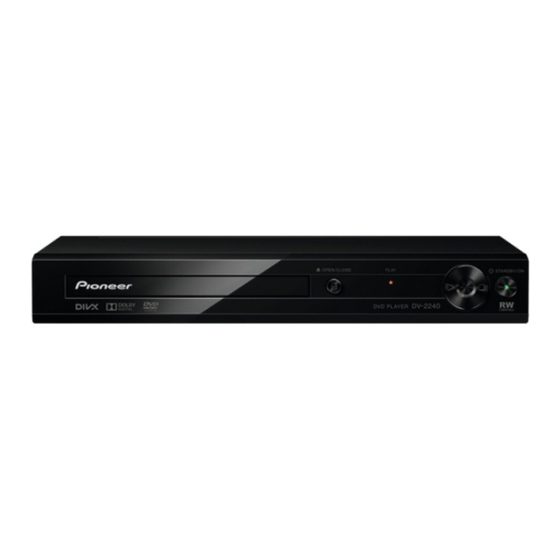
Troubleshooting
When a USB device is connected
Problem
USB device is not recognized.
•
Turn the power off, then disconnect and reconnect the USB device.
•
This player does not support USB hubs. Connect the USB device directly.
This player only supports USB mass storage class devices.
•
•
This player supports portable flash memory and digital audio playback
devices.
•
Only the FAT16 and FAT32 file systems are supported. Other file systems
(exFAT, NTFS, etc.) are not supported.
•
If the USB device is equipped with an AC adapter, use the USB device
with the AC adapter connected.
Some USB devices may not be recognized properly.
•
File cannot be played.
•
Copyright-protected files cannot be played.
Files stored on a computer cannot be played.
•
•
It may not be able to play some files.
Folder or file names are not
•
The maximum displayable number of characters for the folder and file
displayed or properly displayed.
names on the Disc Navigator is 14.
Folder or file names are not
•
The order of the folder and file names displayed on the Disc Navigator
displayed in alphabetical order.
is dependant on the time and date when the folders or files were created
on the USB device.
Much time is required to
•
It may take longer to load data when a large capacity USB device is
recognized the USB device.
connected (this could take several minutes).
Possible causes and solutions
Additional information
Setting the TV system
(Except Taiwan model)
•
If the picture of the disc being played is distorted,
switch the TV system to the one used in your
country or region.
•
When the TV system is switched, the types of discs
that can be played are limited.
•
The factory default setting is AUTO.
While the player is in the standby mode...
Press STANDBY/ON while pressing .
Use the buttons on the front panel.
The power turns on and the TV system switches as
shown below.
• AUTONTSC
• NTSCPAL
• PALAUTO
Types of
Player setting
discs/
Format
NTSC
PAL
AUTO
files
NTSC
NTSC
PAL
NTSC
PAL
NTSC
PAL
PAL
NTSC
PAL
NTSC
PAL
or
PAL
no disc
Cautions on use
When moving the player
When moving the player, check first that there is no
disc loaded and that the disc tray is closed. Then
press STANDBY/ON on the player (or STANDBY/
ON on the remote control), wait for the OFF indicator
on the front panel display to turn off, then unplug the
power cord. Moving the player with a disc inside it
could result in damage.
Place of installation
Choose a stable place near the TV or stereo system
•
being used with the player.
Do not place the player on top of a TV or color
•
monitor. Also install it away from cassette decks
and other devices easily affected by magnetic
forces.
Avoid the following types of places:
•
Places exposed to direct sunlight
Humid or poorly ventilated places
•
•
Extremely hot places
Places exposed to vibrations
•
•
Places in which there is much dust or cigarette
smoke
Places exposed to soot, steam or heat (kitchens,
•
etc.)
Do not place objects on the player.
Do not place any objects on top of the player.
Do not obstruct the ventilation holes.
Do not use the player on shaggy rugs, beds, sofas,
etc., or wrapped in cloth, etc. Doing so will prevent the
heat from dispersing, leading to damage.
Do not expose to heat.
Do not place the player on top of an amplifier or other
component that generates heat. When placing it in
a rack, to avoid the heat given off by the amplifier or
other audio component, place it on a shelf below the
amplifier.
Turn off the player's power when not
using it.
Depending on signal conditions, striped patterns may
appear on a TV screen and noise may enter the sound
of radio broadcasts when the player's power is on. If
this happens, turn the player's power off.
About condensation
If the player is moved suddenly from a cold place
into a warm room (in winter, for example) or if the
temperature in the room in which the player is installed
rises suddenly due to a heater, etc., water droplets
(condensation) may form inside (on operating parts
and the lens). When condensation is present, the
player will not operate properly and playback is not
possible. Let the player stand at room temperature
for 1 or 2 hours with the power turned on (the time
depends on the extent of condensation). The water
droplets will dissipate and playback will become
possible. Condensation can also occur in the summer
if the player is exposed to the direct wind from an
air-conditioner. If this happens, move the player to a
different place.
9
